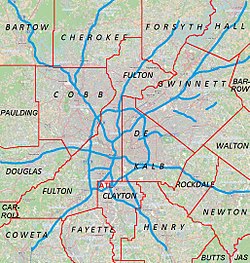Roswell, GA
| Roswell, Georgia | |
|---|---|
| City | |

Roswell City Hall
|
|
 Location in Fulton County and the state of Georgia |
|
| Location of Roswell in Metro Atlanta | |
| Coordinates: 34°01′19″N 84°21′33″W / 34.02194°N 84.35917°WCoordinates: 34°01′19″N 84°21′33″W / 34.02194°N 84.35917°W | |
| Country | United States |
| State | Georgia |
| County | Fulton |
| Incorporated | February 16, 1854 |
| Government | |
| • Mayor | Jere Wood (R) |
| Area | |
| • Total | 42.0 sq mi (108.8 km2) |
| • Land | 40.7 sq mi (105.5 km2) |
| • Water | 1.3 sq mi (3.3 km2) 3.1% |
| Elevation | 1,180 ft (350 m) |
| Population (2010) | |
| • Total | 88,346 |
| • Estimate (2014) | 94,089 |
| • Density | 2,311/sq mi (892.1/km2) |
| Time zone | EST (UTC-5) |
| • Summer (DST) | EDT (UTC-4) |
| ZIP codes | 30075-30077 |
| Area code | 770/678/404 |
| FIPS code | 13-67284 |
| GNIS feature ID | 0332929 |
| Website | www |
Roswell is a city in north Fulton County, Georgia, United States. At the 2010 census it had a population of 88,346, and in 2014 the estimated population was 94,089, making it Georgia's seventh largest city.
In 1830, while on a trip to northern Georgia, Roswell King passed through the area of what is now Roswell and observed the great potential for building a cotton mill along Vickery Creek. Since the land nearby was also good for plantations, his idea was to put cotton processing near cotton production.
Toward the middle of the 1830s, King returned to build a mill that would soon become the largest in north Georgia – Roswell Mill. He brought with him 36 African slaves from his own coastal plantation, plus another 42 skilled carpenter slaves bought in Savannah to build the mills. The slaves built the mills, infrastructure, houses, mill worker apartments, and supporting buildings for the new town. The Africans brought their unique Geechee culture, language, and religious traditions from the coast to north Georgia.
King invited investors from the coast to join him at the new location. He was also joined by Barrington King, one of his sons, who succeeded his father in the manufacturing company. Archibald Smith was one of the planters who migrated there to establish a new plantation, also bringing enslaved African Americans from the coastal areas.
Barrington Hall (the home of Barrington King), Smith Plantation (the home of Archibald Smith) and Bulloch Hall (the childhood home of President Theodore Roosevelt's mother, Mittie Bulloch) have been preserved and restored. They are now open to the public. According to the 1850 Slave Schedules, these three "founding families", together with the next three largest planters, held 192 slaves, 51% of the total 378 slaves held in Roswell District. Archibald Smith had a 300-acre (1.2 km2) cotton plantation. According to the 1850 Census, Barrington King held 70 slaves. Half of these slaves were under the age of 10. These slaves worked in Barrington's household. Barrington King "leased" or "rented" some of his adult male slaves to the Roswell Manufacturing Company, but they did not work around the mill machinery.
The Roswell area was part of Cobb County when first settled, and the county seat of Marietta was a four-hour (one-way) horseback ride to the west. Since Roswell residents desired a local government, they submitted a city charter for incorporation to the Georgia General Assembly. The charter was approved on February 16, 1854.
...
Wikipedia



